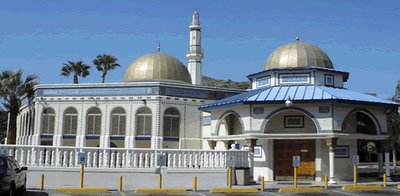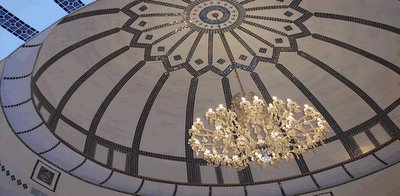On the whole, humanity is rather immature. We are born this way and it normally takes us at least two decades, if not more, to reach a level of cognitive and behavioral maturity that is acceptable to ourselves and society. This level of maturity is taught to us through many means, one of which is the institution of religion. Most religions, including Islam, seek to mature humanity. In Islam, we Muslims mature through our submission to Allah (swt) by conforming to His rules and legislation, which is presented to us in the form of shari'ah. The rules and legislation by which we mature aren't onerous, but they do take a significant level of discipline and determination in order to be carried out successfully and consistently.
This "discipline and determination" is known to us as jihad. It is the greater jihad, the jihad by which we seek to control and contain our nafs, our ego. Those of us who are parents (and I am the father to a five-year-old daughter) see the need to control the nafs daily through our children. "Abah, I want this! Ibu, I want that!" As children get older, their desires become more sophisticated, but their maturity levels also increase as well, insha'allah. People usually get to a point where their material needs are met, but their maturity levels have also plateaued.
The problem is that these maturity levels may or may not have reached their full potential. Have each of us met that full level of maturity? For example, consider three types of behavior: drinking alcohol, gambling and tattooing. All three behaviors are considered both legal (usually) and acceptable within modern non-Muslim society. But even while these behaviors may be acceptable in non-Muslim society, they are considered unacceptable among Muslims.
Engaging in these behaviors are signs of immaturity. An immature person wastes his or her money on alcoholic drinks that can cause numerous individual and societal problems (let alone being a poison to one's body). Through gambling, an immature person wastes his or her money in the unlikely possibility of winning a large payoff. Through tattooing, an immature person "decorates" his or her body with art that is often regretted (and sometimes removed) later in life. A Muslim avoids these immature behaviors altogether, thus bypassing the pain these behaviors may cause to themselves and to others.
Instead of engaging in immature behaviors, the Muslim engages in mature behaviors, especially that of salat (prayer), sawm (fasting), and zakat (and saudaqah, the giving of charity). Each of these behaviors are not only mandated as part of the Five Pillars of Islam, but are of supreme importance for increasing and maintaining the maturity level of Muslims individually and as a society. Salat is of primary importance. It not only restores our focus on Allah (swt) throughout the day, but also helps us to remember (through the various surahs we recite in the individual rakah) what we need to do for society as a whole.
Sawm is similar to salat except that, instead of being an intellectual reminder, sawm is visceral. We feel the hunger that the less-fortunate undergo so that we may acutely understand their needs and be motivated to help society. And, whereas salat and sawm are reminders for action, zakat and saudaqah are the actions themselves, the actual giving of charity to the poor, either directly to those in need, or indirectly, to agencies who will help us distribute the charity to others.
It should be noted that the giving of zakat and, especially, saudaqah goes not only to other Muslims in need, but also to non-Muslims as well. Muslims must act as khalifa, guardians of the community and the environment, to help in the process of maturing humanity, whether the individuals are Muslims or not. In that respect we try to be like the tide, lifting all boats together. We are lifting not only our community but that of the non-Muslim community as well.
Ideally, our goal should be to strive to bring everyone up to the minimum levels (myself included) that are expected of all Muslims in Islam. There are probably very few people who don't fail in one aspect of Islam or another. Are we only meeting what is expected of us with regard to the five pillars (especially that of salat, sawm, and zakat/saudaqah) but of the other aspects of a Muslim lifestyle as well? For example, do we behave with the proper adab? Do we eat halal food consistently, especially in those places where halal food and drink is not so easily available? Do we cover ourselves properly, both men and women, and lower our gaze appropriately, both men and women? Do we minimize our exposure to the negative aspects of our culture (especially as broadcast through the media and entertainment industries)? Do we minimize our exposure to the negative aspects of our economy, such as with regard to interest and casino capitalism as a whole? (I realize this last part is extremely difficult given the pervasiveness of the global interest-based economy. Still, does one try?) Islam addresses all of these issues and provides solutions for the maturation of humanity, but do we listen and implement these solutions into our lives?
Just as parents set limits on their children's behavior, Islam has set limits on our behaviors. Some, the immature, may whine and complain about those limits (with a few going into outright rebellion and/or apostasy because their egos cannot handle those limitations). However, the majority of us understand how we benefit from such self-restraint. One has only to look at the troubles plaguing the non-Muslim world, created by their indulgence in various vices, to see what we can and do avoid: the loss of wealth through gambling or the purchase of alcohol and/or drugs, the increased chance of illnesses through the consumption of alcohol, drugs or other haram products, the spread of sexually-transmitted diseases, especially through zina, the loss and heartbreak of families split apart after cases of adultery, and so on. Moreover, these limitations are lifelong. We do not "graduate" from the limitations once we reach a certain age. Most, if not all, of these limitations will remain with us until death.
What also makes matters difficult is that many of these limitations have little or no ability to be enforced externally; they must be enforced internally. For example, governments can and do enforce some Islamic limitations (even by secular governments) to one degree or another. The sale of alcohol might be restricted to certain hours or prohibited altogether; the sale of various drugs may be strictly regulated or prohibited, depending upon the substance, and so forth. But other Islamic limitations are not enforced by various governments except in certain select cases; for example, riba, zina and adultery. Thus, the individual is left to him- or herself to maintain the limitations. This is the reason for the greater jihad. Can we maintain our ability as individuals and as a society to reach our full potential?
I began to write this essay last December while vacationing in Japan and reading one of Frank Herbert's Dune novels. It is unfinished, from my perspective, and perhaps I will finish it in the future, insha'allah. A couple months ago, I came across another essay, Psychology, Islam & Self-Control, that says much of what I'm trying to say here. I recommend that you read that essay as well.


